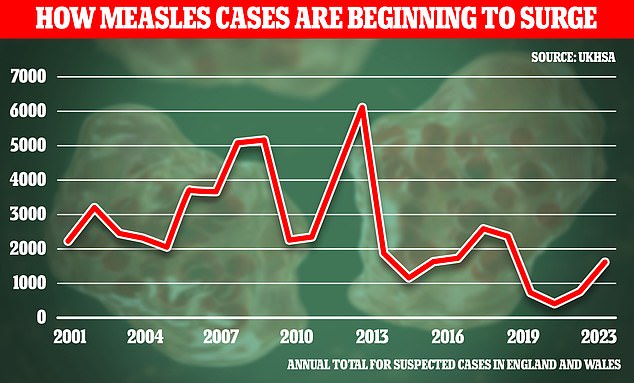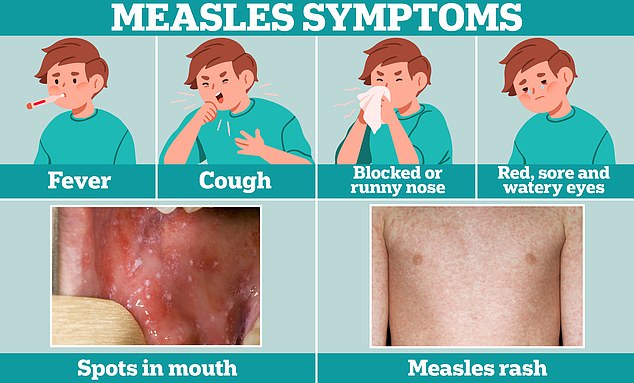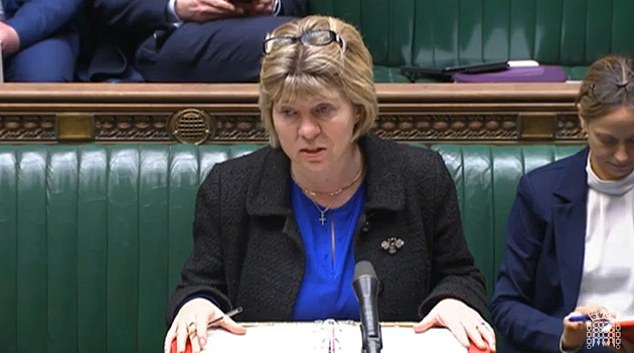Calls for chemists to offer MMR jabs to the NHS to thwart measles as pharmacists say parents who want their children to have the jab struggle to get GP appointments
The NHS must allow pharmacies to administer the MMR jab to prevent further measles outbreaks, health leaders have warned.
Chemists say relying largely on GP practices to deliver the vaccine is flawed as patients often struggle to make appointments.
They are now calling on the NHS and the Department of Health and Social Care to direct them to help with a national catch-up program amid a worrying increase in cases.
A drop in vaccine uptake means almost 3.5 million people under the age of 16 are at risk of measles, mumps and rubella, the government said.
Figures show there have been 216 confirmed cases of measles and 103 probable cases in the West Midlands since October 1 last year.
In England, 89.3 percent of two-year-olds received their first dose of the MMR vaccine in the year to March 2023 (blue line), compared to 89.2 percent the year before. Meanwhile, 88.7 percent of two-year-olds had both doses, up from 89 percent a year earlier
But Britain’s Health Security Agency has declared a ‘national incident’ and is urging parents to vaccinate their children amid fears the cases could spread to other towns and cities.
Some chemists offer private MMR jabs, but the NHS does not fund them to provide a service on their behalf.
Pharmacists’ trade bodies say allowing their members to offer the jab free to patients – with the costs covered by the NHS – would help reverse the trend in uptake as it would make access easier.
Dr. Leyla Hannbeck, chief executive of the Association of Independent Multiple Pharmacies, said pharmacies had successfully helped deliver Covid jabs for the NHS during the pandemic and people appreciated the convenience.
She again called on them to be involved, adding: ‘It is something that pharmacies could be mandated to do as they are already well trained in vaccination services and accessible to patients.
‘At a time when it is difficult for many patients to make an appointment at the GP practice, it makes sense to have such vaccination services arranged through the public pharmacy and to provide convenience for many patients.
‘We have always said that we are willing to help alleviate pressure elsewhere in the NHS if we get the right funding to do so.’
Malcolm Harrison, chief executive of the Company Chemists’ Association, which represents major chains such as Boots and Superdrug, echoed the call.
He said: “Pharmacy teams have significant experience and expertise in delivering national vaccination programmes.
‘Vaccine uptake is strongly influenced by accessibility.
‘Commissioning an NHS vaccine from community pharmacy will make it easier and more convenient for patients to access it, increasing uptake and reducing health inequalities.’
Health Minister Maria Caulfield told MPs yesterday that officials are sending letters to parents of unvaccinated children, GPs are setting up extra clinics and vaccine buses are ‘targeting communities with low vaccination rates’.
The vaccine catch-up program will target all parents of children aged six to 11, urging them to make an appointment for missed MMR jabs.
It will also target low-use areas and contact more than a million people aged 11 to 25 in London and the West Midlands.
Responding to an urgent question in the House of Commons, Ms Caulfield said that if the MMR vaccine is to protect the country, 95 per cent of people need it.
But she warned that the MMR ‘range’ is currently only 89.3 per cent for the first dose at age two and 84.5 per cent for the second dose at age five.
The minister added: “My message to the mothers and fathers of children who have not been vaccinated at this time is to come forward.”
In a separate written statement to Parliament, Ms Caulfield said analysis shows one infected child in a classroom can infect up to nine other unvaccinated pupils, making it one of the most contagious diseases in the world and more contagious than Covid.
She added: ‘One in five children with measles will need to be admitted to hospital for treatment – which could put extra pressure on the NHS.’

The latest data from the UK Health Security Agency (UKHSA) shows that there were 1,603 suspected cases of measles in England and Wales in 2023. This figure is more than double the 735 in 2022 and an almost fivefold increase compared to the 360 reported cases. in 2021

Cold symptoms, such as fever, coughing and a runny or stuffy nose, are usually the first sign of measles. A few days later, some people develop small white spots on the inside of their cheeks and the back of their lips. The characteristic rash of measles also develops, usually starting on the face and behind the ears, before spreading to the rest of the body.

Health Minister Maria Caulfield today called on mothers and fathers of unvaccinated children to ‘come forward’. She said: ‘It’s not too late, there is no age limit, anyone who has not had their vaccination can come forward’
Alastair Buxton, Director of NHS Services at Community Pharmacy England, said: ‘Community pharmacies are very popular vaccination centers and with the right funding and support they could become home to a much wider range of NHS vaccinations, including MMR jabs.
‘This would be useful for the public and also help to reduce pressure on busy GP practices.’
Conservative MP Steve Brine, chairman of the Commons health and social care committee, said the government should commit to a ‘flexible delivery model, including through pharmacies’.
He added: ‘It is deeply concerning to see warnings about the potential spread of measles against a backdrop of known and declining vaccination levels.’
Steve Russell, NHS director of vaccinations and screening, said the health service was “acting quickly to tackle the spread of measles”.
An NHS England spokesperson said: ‘GPs and their teams are doing a good job of safely vaccinating children, and their efforts last winter led to an increase of around 10 per cent in the number of measles, mumps and rubella (MMR) vaccinations. given to children. compared to last year.
‘The NHS is contacting millions of parents and carers of children to book their children for an appointment with a GP for their missed MMR vaccine to tackle the current resurgence of measles, and more broadly the NHS continues to investigate ways in which pharmacies can deliver vaccines to children.’
